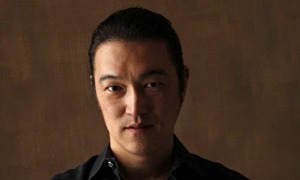The killing of a Japanese journalist just over a week ago made headlines around the world, but his name is probably forgotten by many if it was ever known at all. Kenji Goto is the Japanese journalist who was beheaded by an Islamist State militant. He was seized in late October in Syria when he went there to try to rescue a Japanese friend who was captured last summer. In a video released in January, the captors threatened to kill both men unless the Japanese government paid $200 million for their release. Japan’s Prime Minister Shinzo Abe had recently pledged $200 million in non-military aid to countries in the Middle East dealing with the Islamist State.
People and organizations who track the state of free press in the world say the last three years have been the worst on record. According to the Committee to Protect Journalists, in 2014, 61 journalists lost their lives and 221 were imprisoned. The lives of journalists and the information they’re trying to report have perhaps never been at greater risk.
Dana Priest, two-time Pulitzer Prize winning reporter for The Washington Post and a professor at my alma mater, The University of Maryland Philip Merrill College of Journalism, recently assigned each of her students an imprisoned journalist to track to help them better understand the risks some reporters take to cover important human rights stories.
“I was shocked when I started to understand how bad the situation was everywhere,” said Priest. “It’s a story. About us losing something fundamental, which is information.”
The story is in part about the people — like Kenji Goto — who are willing to take the risks required to report stories that hold governments, politicians and even illegal organizations, such as terrorist groups and drug cartels, accountable for their actions.
“Their courage is inspiring,” said Priest. “They hate the suffering and want people to see it. They are people who won’t leave their countries just because they’re under death threat. They want to make their countries better. They often don’t want asylum.”
The bigger story, as Priest suggests, is about the role of a free press in giving us access to information we need to make the world a safer place. The economics of the news business are making it challenging enough to report in-depth, fact-checked stories about any topic. As organizations up the ante on the tactics they’ll use to silence journalists — charges of blasphemy and defamation, imprisonment and even killing — the risk of losing critical news coverage escalates.
“We are in a race to figure out a business model to save the industry and risking not teaching the next generation of reporters how to keep the government accountable,” said Priest. “People don’t understand what it takes to do real journalism … to unearth real info. And how important it is to the democratic process.”
Kenji Goto, those who died before him and the hundreds who are imprisoned humanize the crisis we’re facing. Goto chronicled his experiences and explained his motivation to enter dangerous regions in order to report atrocities to the Japanese people on a website called Independent Press.
Do you know his name? Are you Kenji Goto?

